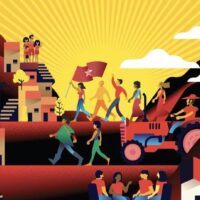

Cover Art for the book Commune or Nothing! by Chris Gilbert
The empire throws the stone but hides its hand, and the obedient mass media (The New York Times included) follows suit by telling only of the reactions provoked by repeated imperial stonings. Two million Palestinians have been made hostage in the world’s largest open-air prison for decades, where they are subjected to repeated attacks and humiliations. Then, lo and behold, some Palestinians creep out of the-prison-that-is-Gaza to fight against their oppressors and seize some hostages of their own. Now, the press is horrified by what it failed to condemn and usually failed to even mention: the long and much larger scale lead-up in which Israel and the United States were the perpetrators.
The same sickening law of silence and brazen disregard for cause and effect applies to Venezuela, where almost a decade of cruel US sanctions have worked to systematically destroy the country’s economy and its institutions. An amnesiac and narcoleptic media apparatus wakes up to proclaim quelle horreur! as desperate people leave the country and some of them arrive at your doorstep in the U.S. Yet, if more than half the story had been told, people could see that this is not an enemy arriving to your sacred shores, but rather survivors from a passenger ship that you, or really your government and ruling class, have deliberately sunk.
In my new book, Commune or Nothing! Venezuela’s Communal Movement and Its Socialist Project, I don’t focus on the destruction that U.S. sanctions have wrought in Venezuela so much as the impressive alternatives that ordinary people have created even in these very dire conditions: especially the country’s socialist communes and other self-organized initiatives. Nevertheless, I did write this (relatively) impassioned (for me) passage about the U.S. sanctions, courting a metaphor that I knew would rub some people the wrong way:
“Sometimes the true dimensions of contemporary events can best be perceived with comparisons. Arguably, the sanctions the United States have imposed on Venezuela since 2015 can be compared to putting the entire population of the country—including children, the old, and the sick—in a concentration camp. Under the regime of sanctions, every day brought a new turn of the screw for the population, in a context defined by scarce food, daily deaths, and almost no light at the end of the tunnel. One looked around and saw the clothes falling off people, dazed patients without medication wandering the streets, families making desperate plans to migrate, and one got the distinct feeling that the depths of human cruelty were being probed. What were these ruthless coercive economic measures for? The experience could leave you feeling paralyzed. What possible motive could make a powerful country want to decimate the population of another? Was it for their sin of being born Venezuelans, just as in the last century others were persecuted and murdered for being Jews or Armenians? Thinking about the U.S. blockade could leave you feeling nonplussed, empty, and hopeless.”
In the section of my book that follows, which focuses on El Panal Commune in Caracas, I go on to explain how its charismatic leader, Robert Longa, responded to the hopeless, nonplussed state of people in his barrio in the wake of the sanctions by coming up with a highly imaginative narrative that would kindle hope, rebuild morale, and point to a better future. He talked about “Year Zero,” about beginning again, all the while riffing on Bolívar and Gramsci and Chávez… In that longish chapter, I call Longa – who lived on the street as a kid and even now always sleeps armed – a “poet-in-residence” in his community. Mind you, he’s a poet who conceived and helped to organize a socialist commune that incorporates some 10,000 people. It’s poetry in the truest sense, in as much as poiesis means making and there is rarely any serious making that occurs in the world without an important dose of poetry mixed in.
What I don’t mention in the book is that the idea of the regime of US sanctions imposed on Venezuela as resembling a concentration camp was put into my head by Longa himself, who told me he had recently watched Life Is Beautiful and identified closely with Guido, the protagonist. Many people have legitimate criticisms of that 1997 film by Roberto Benigni, but the story goes on winning over audiences. Its secret, I think, is the following: only when juxtaposed to a clear example of beauty – in this case the story of a caring and creative father and his enamored child – can we feel anew the full horror of the Holocaust.
In my book, which is mostly about the theory, practice, and history of socialist commune building in Venezuela, I might be legitimately faulted for not focusing enough on the U.S. sanctions on the country – which are real, terrible, and still causing deaths every day – but my best defense is that I was guided by the following reflection: Only by seeing what Venezuelans have created in the crisis and the beauty of their creations, which include but are not limited to their socialist communes, can one appreciate the true dimensions and the horror of what US politicians and its ruling class have done. In effect, I hope that when set beside the shining example given by the Venezuelan people, one begins also to sense the wan murderousness of the empire, the banality of its evil.
The post Venezuelan Migrants: Survivors from a Passenger Ship That You Sunk appeared first on CounterPunch.org.
This post was originally published on CounterPunch.org.

